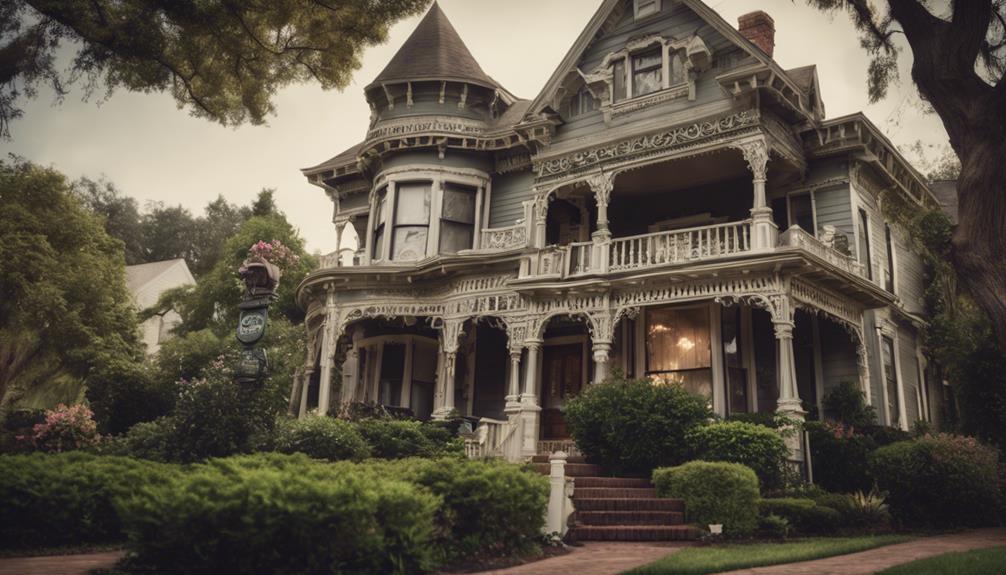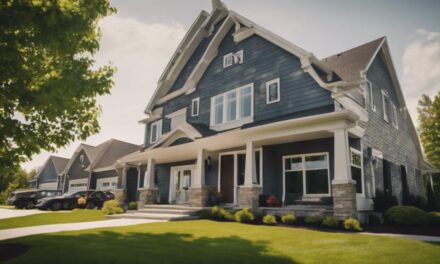When you're on the hunt for historic homes for sale, your journey should start with exploring neighborhoods known for their rich architectural heritage. Seek recommendations from friends, family, and local historical societies to get trustworthy leads. Don't forget to utilize online forums and social media groups where enthusiasts and experts share valuable insights. Equally important is understanding the regulations imposed by historic preservation commissions to make sure you're compliant. But before you get too far, there's a vital step you shouldn't overlook—verifying the credentials and experience of real estate agents specializing in historic properties. Wondering how to make sure you're on the right track?
Key Takeaways
- Explore online platforms like OldHouses.com, CIRCA Old Houses, and Zillow for historic home listings.
- Consult local historical societies and preservation organizations for recommendations and exclusive listings.
- Partner with real estate agents specializing in historic properties for expert guidance and access to off-market homes.
- Verify property details and historical significance through national, state, or local registers of historic places.
- Utilize specialized directories and forums for community insights and hidden gem properties.
Explore Historic Neighborhoods
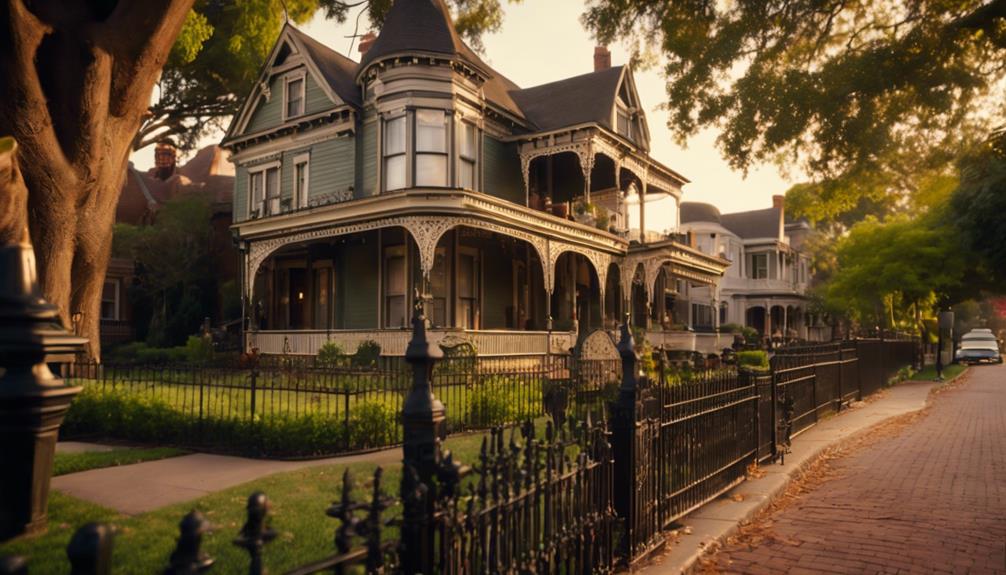
When you explore historic neighborhoods, you'll find well-preserved homes that showcase unique architectural styles and tell rich stories of the past. These areas are often carefully maintained, with properties that may be listed on local historic registers or designated as historic districts by the city or state.
As you walk through these neighborhoods, you'll notice a variety of architectural styles, from Colonial Revival and Victorian to Craftsman and Mid-century Modern. Each style reflects the period in which it was built, providing a tangible connection to different eras of architectural trends and local history.
Living in a historic neighborhood offers more than just aesthetic appeal; it provides a deep sense of community and connection to the area's past. Residents often take immense pride in maintaining the character and charm of their homes. You'll find that neighbors share a common passion for preservation and a collective effort to uphold the historical integrity of their environment. This communal dedication not only enhances the beauty of the neighborhood but also fosters a strong sense of belonging among its inhabitants.
Exploring these neighborhoods gives you invaluable insights into the local history and architectural trends of a particular area. You'll discover the stories behind the homes, learning about the people who lived there and the events that shaped the community. This historical context enriches your understanding of the area and deepens your appreciation for the preservation efforts that keep these neighborhoods thriving.
Whether you're a history buff, an architecture enthusiast, or just someone looking for a unique home, historic neighborhoods offer a wealth of experiences and opportunities.
Seek Recommendations
As you immerse yourself in the charm of historic neighborhoods, it's wise to seek recommendations from trusted sources to find the right real estate agent for your unique needs. Start by asking friends, family, or colleagues who've successfully purchased historic homes. Their firsthand experiences can provide invaluable insights into which agents possess the expertise necessary for guiding through the intricacies of historic properties.
Next, consider reaching out to local historical societies or preservation organizations. These groups are often deeply embedded in the community and can recommend real estate agents who specialize in historic homes. Their referrals are typically grounded in a shared commitment to preserving architectural heritage, making certain you work with someone who values the historical significance of your potential new home.
Online forums and social media groups dedicated to historic homes are also rich sources of information. Enthusiasts and experts alike congregate in these virtual spaces, offering leads on agents who've built a reputation for excellence in the field. Engaging with these communities can yield valuable recommendations and even foster connections with like-minded individuals passionate about historic preservation.
Additionally, utilize online directories and real estate platforms to identify agents who specialize in historic properties. These platforms often allow you to filter your search to find professionals with a proven track record in handling historic homes.
Once you have a shortlist of potential agents, take the time to verify their experience by reviewing past listings and client testimonials. This step ensures you choose an agent who isn't only knowledgeable but also highly regarded by previous clients.
Understand Regulations
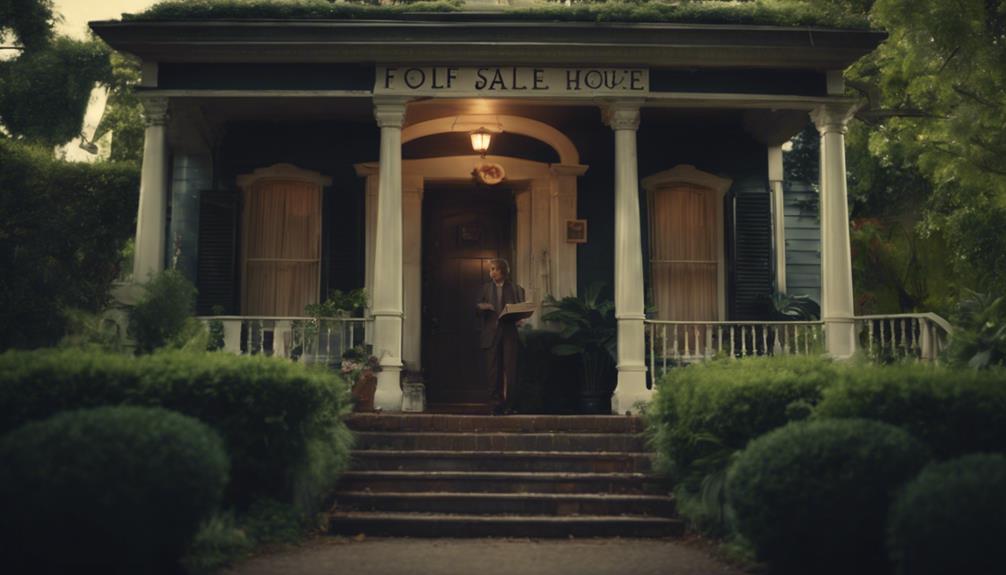
Understanding the complex network of regulations for historic homes is vital to preserving their architectural integrity and ensuring compliance with local preservation standards. When you're looking into purchasing a historic home, it's important to familiarize yourself with the specific restrictions that may apply. These regulations are often imposed by local historic preservation commissions or districts and are designed to maintain the historical charm and authenticity of the property.
One of the key aspects of these regulations is the limitation on exterior modifications. You might find that you're restricted in the types of materials you can use for renovations. For instance, if your historic home has wooden window frames, replacing them with modern vinyl could be prohibited. Similarly, regulations might dictate the kinds of roofing materials or the type of siding you can use, ensuring they match the original construction as closely as possible.
Additionally, don't overlook the potential restrictions on paint colors. Some historic districts have a specific palette of approved colors that you must adhere to, preserving the visual consistency of the area. These paint regulations aren't just about aesthetics; they also help maintain the cultural significance of the community.
To navigate this intricate regulatory landscape, it's important to understand and comply with these rules. This might involve researching the local historic preservation commission's guidelines or reviewing the district's standards. Non-compliance can lead to fines or even legal action, making it imperative to stay informed.
Assess Real Estate Agents
When evaluating real estate agents, begin by checking their licensing and experience, especially in historic properties.
Make sure they understand and can navigate the specific regulations tied to historic districts.
Prioritize agents who demonstrate clear communication and accessibility, as these characteristics are essential for successfully managing the unique challenges of historic home transactions.
Licensing and Experience Check
To confirm you're working with a qualified professional, start by verifying the real estate agent's licensing status through your state's real estate commission website. This step guarantees the agent is legally authorized to practice and has met all state requirements.
Next, focus on the agent's experience, especially in dealing with a historic house. An agent with a solid track record in historic home sales is invaluable. They should have successfully navigated the complexities unique to these properties, such as preservation guidelines and structural considerations. Ask for specifics—how many historic homes have they sold? How familiar are they with the challenges and rewards of owning such properties?
Don't hesitate to seek references from previous clients who've bought or sold historic homes with the agent. These conversations can provide insights into the agent's capabilities and dedication to preserving the home's historical integrity.
In addition, inquire about the agent's knowledge of local historic districts, zoning regulations, and preservation incentives. An agent well-versed in these areas can guide you through potential regulatory hurdles and uncover financial benefits, ensuring your historic house purchase is both rewarding and compliant with preservation standards.
Specialization in Historic Properties
Immerse yourself in the search for a real estate agent who specializes in historic properties by seeking recommendations from other historic homeowners and verifying their experience with local regulations. Start by asking around within the community of historic home enthusiasts. These homeowners often have invaluable insights and can direct you to agents who understand the complexities of historic properties.
Next, verify the agent's familiarity with regulations in historic districts. This includes knowing about restrictions on renovations and the requirements for preserving the property's historical integrity. You can gauge their expertise by discussing specific scenarios and observing their responses.
Check if the real estate agent has listings on national, state, or local registers of historic homes. An agent who regularly handles such listings is likely well-versed in the unique challenges and opportunities these properties present.
Explore historic neighborhoods with the agent. Their ability to provide detailed information about the area's history and architecture will reflect their depth of knowledge.
Communication and Accessibility
After identifying a real estate agent with expertise in historic properties, it's essential to assess their communication skills and accessibility to guarantee a smooth and informed buying process. Start by evaluating how promptly and clearly they respond to your inquiries. An agent who's easy to reach via phone, email, or social media platforms can provide timely updates and address any concerns you might have.
Check if they actively list properties on the Multiple Listing Service (MLS) and other platforms, ensuring maximum exposure and access to a wider range of potential historic homes. An agent familiar with the MLS can help you navigate listings that meet your specific criteria, including properties on national, state, or local registers for historic homes.
Additionally, inquire about their use of social media to market properties. An agent who leverages social media effectively can offer insights into the latest listings and trends in historic neighborhoods, enhancing your search process.
Verify Listings
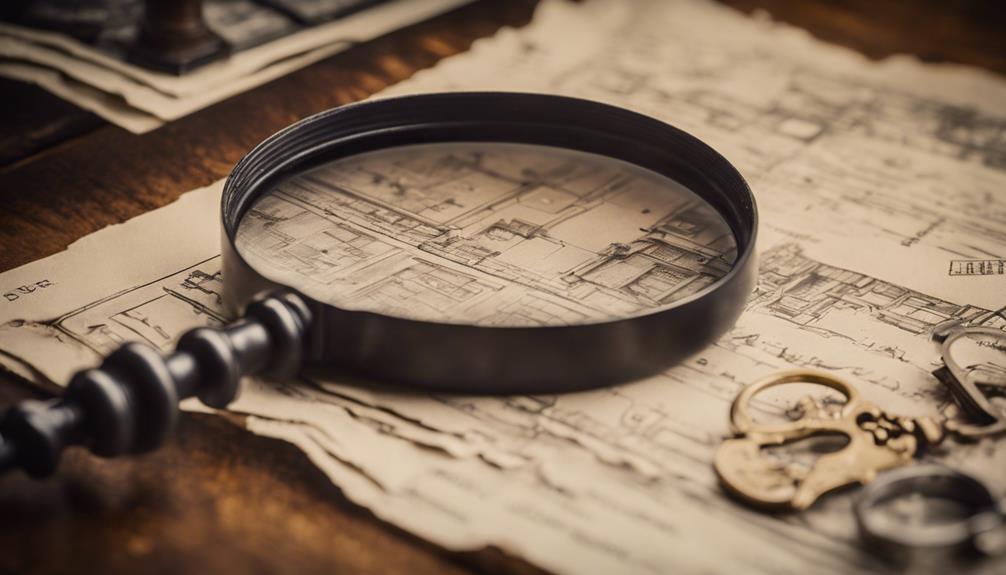
When verifying historic home listings, begin by confirming the property's age and its significance in cultural or architectural history.
Check if the home is recognized on national, state, or local registers of historic places for added authenticity.
Validate that the architectural details and construction date align with the MLS descriptions to maintain historical integrity.
Check Authenticity Sources
To verify the authenticity of historic home listings, start by consulting reputable sources like CIRCA Old Houses, partnerships with the National Trust, and local historical societies. These platforms specialize in curating and promoting genuine historic properties, guaranteeing that you're not misled by inaccurate listings.
CIRCA Old Houses, for instance, focuses exclusively on old house listings, providing a curated selection of homes that meet specific historical criteria.
Cross-referencing information from multiple sources is essential. Look for properties listed on national, state, or local historic registers; this confirms that the home has been verified for its historical significance. The National Trust for Historic Preservation often collaborates with real estate platforms to validate the authenticity of listed properties, making their partnerships a reliable indicator of a home's historic value.
Moreover, seek out real estate agents who've expertise in historic properties. These professionals can provide valuable insights and verify the authenticity of listings through their specialized knowledge.
Local historical societies are also invaluable; they maintain records and can confirm the historical integrity of a home. By leveraging these resources, you can confidently navigate the market and find a truly authentic historic home.
Confirm Property Details
Verifying property details guarantees you get an accurate picture of the historic home's true attributes and value. Start by cross-referencing information across multiple listing sources. This step is important because old listings can sometimes contain outdated or inaccurate information.
Pay close attention to the square footage, acreage, and the amenities mentioned in the historic home's description. These factors contribute greatly to the home's overall value and can vary across different sources.
Ensure that the listing date and any additional comments about the property are accurate. Inconsistencies can indicate red flags or outdated information. You'll also want to verify the number of bedrooms, bathrooms, and other key features. This information should be consistent across all listings to avoid any surprises once you proceed with a purchase.
Here are key items to cross-reference when confirming property details:
- Square footage and acreage
- Number of bedrooms and bathrooms
- Amenities and unique historic features
- Listing date and status
Check Non-MLS Sources
Exploring non-MLS sources like OldHouses.com and CIRCA Old Houses can significantly enhance your search for historic homes with unique architectural and historical value. These platforms specialize in showcasing properties that stand out for their historical significance and design. Whether you're captivated by the intricate woodwork of a Victorian mansion or the quaint charm of a historic cottage, these sources provide a wealth of listings.
OldHouses.com and CIRCA Old Houses curate a diverse array of properties that often elude traditional MLS listings. By tapping into these resources, you can uncover hidden gems that mightn't appear in conventional channels. These platforms are particularly beneficial if you're seeking a home with specific architectural features or historical importance. They often include detailed descriptions and high-quality photos, giving you a thorough view of each property's character and condition.
What's more, non-MLS sources provide access to off-market listings, expanding your options beyond the mainstream market. This can be especially valuable in competitive real estate environments, where unique historic homes are highly sought after. By diving into these specialized platforms, you connect with like-minded enthusiasts who share your passion for preservation and historical architecture.
When using OldHouses.com and CIRCA Old Houses, you'll often find that these sources offer more than just listings. They frequently include rich historical contexts and preservation tips, helping you appreciate the full value of the homes you're considering. This focus on preservation ensures that the historical integrity of these homes is maintained, making them a rewarding investment for history buffs and architectural aficionados alike.
Use Online Resources

Harness the power of online resources like OldHouses.com, CIRCA, and Zillow to uncover historic homes that blend unique architectural features with rich historical narratives. These platforms offer robust search functionalities and filters to help you find properties that meet your specific criteria. From Victorian mansions to charming cottages, online resources provide access to a wide array of historic homes across the country.
To broaden your search, consider exploring:
- Old House Dreams: This site curates listings of unique old houses, providing detailed descriptions and photographs to help you visualize potential properties.
- The Old House Life: A go-to for curated historic home listings, this platform offers insights into each property's history and architectural style.
- HistoricProperties.com: Known for its extensive listings, this site connects you with both high-end and affordable historic properties, ensuring you find a home that fits your budget and taste.
- CheapOldHouses.com: Perfect for those looking for budget-friendly options, this site showcases charming historic homes that are often in need of some TLC, making it ideal for preservation enthusiasts.
In addition to these specialized websites, collaborating with real estate agents who specialize in historic homes can provide personalized assistance. They've the expertise to navigate the unique challenges and opportunities associated with purchasing a historic property. Moreover, national and local historic property registries offer detailed listings, giving you a broader perspective on available homes.
Partner With Preservation Trusts
After leveraging online resources, you can further enrich your search for historic homes by partnering with preservation trusts like the National Trust for Historic Preservation. These organizations are dedicated to the conservation and restoration of historic properties, offering a plethora of resources that can greatly enhance your buying experience.
When you partner with preservation trusts, you gain access to specialized databases filled with listings of historic homes for sale. These databases often include properties that aren't widely advertised, giving you a unique edge in finding hidden gems. The National Trust for Historic Preservation, for instance, maintains a detailed database of historic properties, many of which are in dire need of preservation. This can be an excellent opportunity for those interested in restoration projects.
Preservation trusts don't just help you find historic homes; they also provide invaluable guidance on the preservation and restoration process. They offer expert advice on maintaining historical integrity while updating properties to meet modern standards. Additionally, these trusts frequently offer information on funding opportunities, such as grants and tax incentives, which can alleviate some of the financial burdens associated with restoring historic properties.
Partnering with preservation trusts also connects you with communities dedicated to historic conservation. This network can provide support, camaraderie, and a shared passion for history, making your journey as a historic homeowner even more rewarding. You'll gain insights into the historical significance of homes and neighborhoods, enriching your appreciation and understanding of the property you're considering.
Connect With Specialists
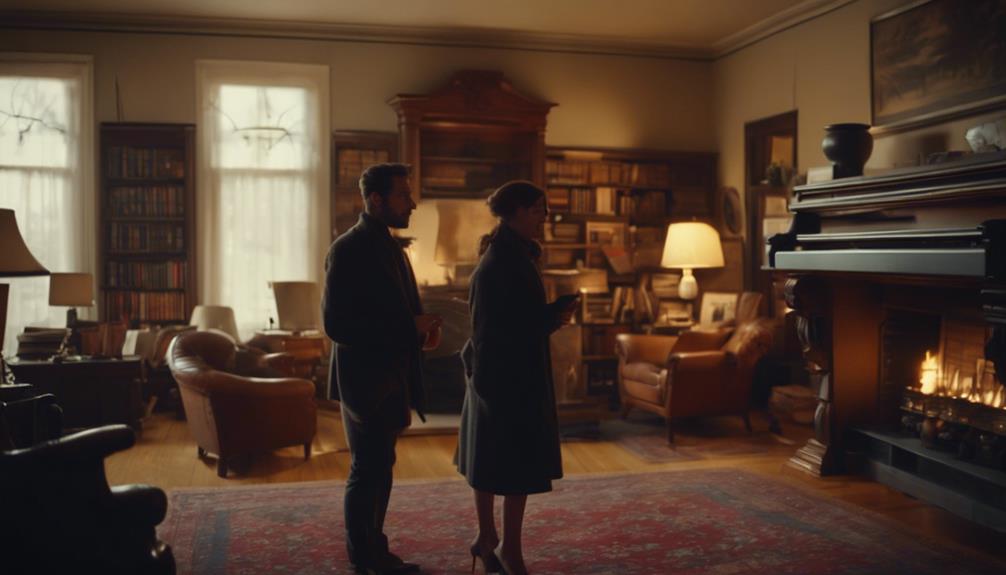
To navigate the complexities of purchasing a historic home, connect with real estate agents who specialize in historic properties. These specialists have the expertise to guide you through the intricacies of buying a home steeped in history. Their deep understanding of preservation, unique architectural elements, and regulatory nuances can be crucial in making an informed purchase.
Specialized real estate agents offer several advantages:
- Exclusive Listings: These agents often have access to exclusive listings that aren't widely advertised, giving you a first look at some of the most coveted historic properties.
- Regulatory Insight: Historic homes come with specific regulations and preservation requirements. Agents with a focus on historic properties can help you navigate these rules to guarantee compliance.
- Evaluation Expertise: They can identify unique features and potential challenges specific to historic homes, such as structural integrity and historical accuracy, before you make a commitment.
- Resource Network: These agents typically have a network of professionals, including preservation architects, contractors, and historians, who can assist with renovations and restorations.
Frequently Asked Questions
How Do You Find the History on a Old Property?
Finding a property's history is like piecing together a grand puzzle. Start by diving into property records to trace its past owners.
Explore local archives for renovation details and architectural styles that mark its era. Don't overlook historical markers or plaques on-site. Talking to neighbors can unearth hidden stories.
For a thorough search, consider hiring a professional historian who specializes in property history and preservation.
What State Has the Best Victorian Houses?
You'll find some of the best Victorian houses in Michigan. Cities like Adrian, Britton, and Saginaw are popular destinations for their beautifully preserved Victorian homes.
These houses showcase stunning architectural features like intricate woodwork, grand staircases, and ornate facades. Michigan's dedication to preservation guarantees these historic homes maintain their 19th-century charm, offering a unique living experience for those who appreciate detailed craftsmanship and historical significance.
What Is a Historic House?
Think of a historic house as a tangible piece of 'Gone with the Wind' or 'Pride and Prejudice.' It's a structure recognized for its cultural or physical significance.
These homes often showcase distinct architectural styles, reflecting various historical periods. Preservation efforts guarantee these properties maintain their original charm, contributing to the area's cultural heritage.
You'll find unique features, from intricate woodwork to grand facades, making each historic house a treasure trove.
How Do I Find Out About My Old House?
To find out about your old house, start by exploring local archives for historical records. Check property deeds for ownership history and any significant changes over the years.
Consult with local historical societies and preservation organizations—they're invaluable for detailed insights. Previous owners may also have stories or documents.
Consider hiring a professional appraiser or historian for a thorough evaluation of your home's historical significance.

